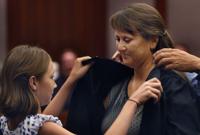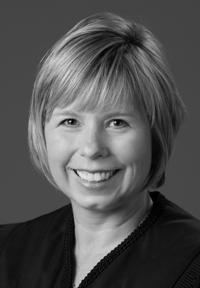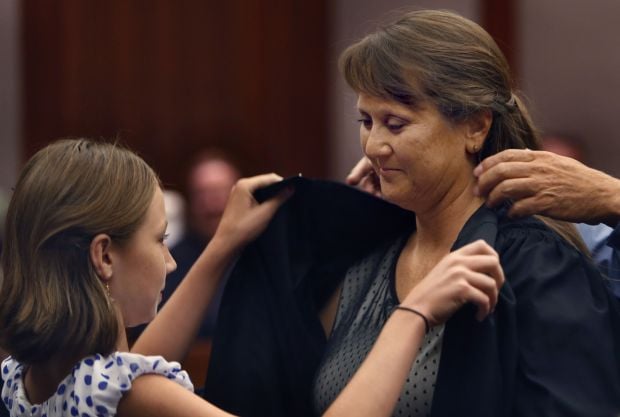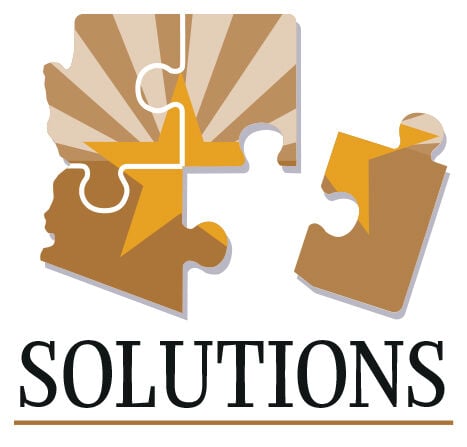Arizona's judiciary is overwhelmingly and disproportionately white. But a volunteer group of legal professionals is working to introduce kids and teens of diverse backgrounds to careers as judges.
High school and college students in Tucson networked with professionals at one such event this spring. They heard Tucson City Court Judge Geraldine Hale, a member of the Navajo Nation, talk about growing up on the reservation.
"I'm first generation everything," she said, adding that she was the first person in her family to attend college or law school and become a lawyer and judge.
Hale spoke through tears, saying that when she told her mother she was going to college and wouldn't be around to help, her whole family told her she needed to stay on the reservation and work. She struggled in college, but knew she couldn't fail, since she'd had to beg to leave the reservation.
"It was hard for me. But I had something in my spirit that I have to do this for me," Hale said.
As she spoke about her sense of responsibility to her family, several students in the room nodded their heads, while others fought back tears of their own.
Joan Wagener, a judge in Pima County Juvenile Court, who is of Japanese descent, talked about becoming the second woman of color to serve on the bench in all of Pima County.
“There are a lot of us who didn’t have professionals in our lives and access to professionals in our lives growing up, and that’s OK,” Wagener told the group.

Pima County Superior Court Judge Joan Wagener, who says she was the second woman of color appointed to the bench in Pima County, during her investiture ceremony in 2014.
The message resonated in particular with a student in the group who is studying at UA's College of Public Health. She told the others she's also a "first generation everything," having come to the U.S. with her mother four years ago from the Philippines.
More than a dozen students from BASIS Tucson North, Tanque Verde and Sunnyside high schools, Pima Community College and the UA attended the event, through the state's Legal Futures program, discussing civil liberties, their daily lives and their dreams.
"The whole idea is really trying to create true pipelines and a pathway for them" to judicial careers, said Alfred Ray English, assistant dean of the Sandra Day O'Connor College of Law at ASU, and chairman of the Legal Futures workgroup.
The need is stark, according to an April 2021 report on Arizona court diversity by the Arizona Advocacy Foundation.
Justice Court, which is the most racially diverse and representative court, is 80% white, even though the state's population is around 55% white, the report says.
There are no women of color on the Arizona Supreme Court and only one Latina on either Division of the Court of Appeals, the report says.

In the counties' superior courts, which handle most criminal cases, only 14 of the 179 judges are Black, Indigenous or other people of color, the report showed.
Legal Futures initiative
The Arizona Supreme Court Commission on Diversity, Equity and Justice in the Judiciary was created more than two decades ago as the Commission on Minorities in the Judiciary, with one of its mandates being to enrich diversity in the judiciary to reflect the community it serves. The name was recently changed, but the goals remain the same.
Made up of judges, attorneys and paralegals working in jurisdictions across the state, and law professors from both the University of Arizona's and Arizona State University's law schools, the committee meets regularly to discuss outreach efforts and hosts an annual law day for high school and college students across the state.
Legal Futures started in 2017 as an annual event designed to connect students with people working in the legal profession, particularly judges. The idea was to get students to spend four or five hours at a table with a judge during a hands-on event introducing them to careers and pathways into the justice system, said English.
The event took place only in Phoenix for the first three years, with about 50 participants each year, and paused for COVID in 2021. Organizers expanded the event for its return in 2022, holding Legal Futures simultaneously in Phoenix, Tucson and Yuma on a Friday in April, with roughly 100 high school and college students participating.
"It was a great success that we were able to pull it off," English said. "Next year, we hope to also go onto a reservation."
English is also part of ASU's pipeline initiative, seeking to recruit high school students from diverse backgrounds into the college and law school.
"We're trying to be a touchpoint for them in the legal community," English said.
Attendees of Tucson's Legal Futures event spent the morning at Pima County Juvenile Court learning about careers in the legal system and networking with local professionals. Most left with contact info for a judge or lawyer, and they all left with the knowledge that a career in the judiciary is available to them.
Besides Hale and Wagener, Pima County Superior Court Judge Lisa Abrams also took part, along with a UA law professor, local attorneys of various disciplines, and paralegals.
Advisors were also on hand, including Sunnyside's Anthony Leon, who oversees the school's teen court program. A former bailiff at Pima County Superior Court, Leon "melded his two passions" when he signed on as Sunnyside's wrestling coach and took over the teen court program. "I have the best students on campus," Leon told the group.
"Courts are way behind"
After introductions and a video about the court system, students debated the pros and cons of a fake proposed law that would give school administrators access to students' social media accounts in order to police cyberbullying on campuses.
During the discussion about the fake Proposition 13, participants discussed how society moves faster than the law, meaning often times there aren't laws on the book to address problems that arise.
"Courts are way behind on rights, on science and everything, which is bizarre to me," Leticia Marquez, a federal public defense attorney, told students at her table.
Ultimately, students decided the proposition would be overkill, although they contended that a law like this could potentially reduce school shootings or prevent tragedies like 9/11.
In the end, they decided the violation of privacy and threat it posed to students' free speech rights didn't outweigh the benefits.
Marquez handed out her business card, telling students to email her.
"Like if I get in trouble with the police?" one asked with a laugh.
"Don't talk, ask for your lawyer and don't give them your phone," she responded, without missing a beat.
"You could sit on that bench"
After a catered lunch, paid for by commission members, the group headed next door to juvenile court to check out a courtroom and try on a judge's robe.
"It seems like a silly thing, but it's not. It's putting on the uniform of the profession you're interested in," said Superior Court Judge Abrams. "There were selfies being had, and they got to sit on the bench under the seal of the state."

Abrams
"It was great meeting the kids. Such different interests and areas of town were represented, it made for a nice, engaging conversations," she said.
Abrams attended an all-women's college and is the child of immigrants, with her mother becoming a U.S. citizen in 2007.
"My experiences shaped me," she said, saying the committee piqued her interest as a way to engage with the community and ensure the future judiciary represents the people it serves.
"I think it's exciting to be part of an outreach to young people in our community and give them that nudge that you could sit on that bench one day, those could be your initials on that robe," Abrams said. "It never dawned on me that I would be a judge until a judge called me and said I should apply."
If the group can create a pipeline of diverse law students and a legal community that reflects the state's cultural diversity, Abrams says that would make Arizona "such a rich place to live."
"It just takes one person saying 'I believe in you' to forge forward and put your name out there and make decisions and choices and set different goals," Abrams said.
But applying to be a judge is a difficult process and just putting one's name out there can be daunting, Abrams said, adding that the committee wants to be able to provide support to participants and future applicants.
"It's a diverse group itself. We have city court judges, the law school is represented, we have a member from Navajo County Justice Court, municipal courts and attorneys on board," Abrams said of the committee. "All vibrant people who care about serving the community."
Creating a pipeline
Last year, the commission informally launched a summer internship program with judges in the Phoenix court system, English said.
It officially launched this summer, with five undergraduate students spending six to eight weeks working with a judge in the Court of Appeals.
"Tucson is the next stop," English said of the program.
The group is also talking about creating a semi-regular newsletter as a way to engage students who have participated in Legal Futures and keep them connected with resources, with English saying that tracking attendees after the workshop is over is a challenge.
"We're trying to figure out how do we create a true pipeline, where you engage someone at one point and continually throughout the whole process," English said.
Courts can't accept donations or fundraise, so funding for the program's expansion is hard to come by. That's why strategic partnerships with other agencies and groups are so important, English said.
"It's really about exploring where our limitations are and what we can do to create an inclusive environment."








